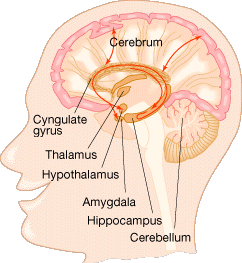We've long known that the ability to laugh is helpful to those coping with major illness and the stress of life's problems. But researchers are now saying laughter can do a lot more -- it can basically bring balance to all the components of the immune system, which helps us fight off diseases. (See How the Immune System Works.)
As we mentioned earlier, laughter reduces levels of certain stress hormones. In doing this, laughter provides a safety valve that shuts off the flow of stress hormones and the fight-or-flight compounds that swing into action in our bodies when we experience stress, anger or hostility. These stress hormones suppress the immune system, increase the number of blood platelets (which can cause obstructions in arteries) and raise blood pressure. When we're laughing, natural killer cells that destroy tumors and viruses increase, as do Gamma-interferon (a disease-fighting protein), T-cells, which are a major part of the immune response, and B-cells, which make disease-destroying antibodies.
Laughter may lead to hiccuping and coughing, which clears the respiratory tract by dislodging mucous plugs. Laughter also increases the concentration of salivary immunoglobulin A, which defends against infectious organisms entering through the respiratory tract.
What may surprise you even more is the fact that researchers estimate that laughing 100 times is equal to 10 minutes on the rowing machine or 15 minutes on an exercise bike. Laughing can be a total body workout! Blood pressure is lowered, and there is an increase in vascular blood flow and in oxygenation of the blood, which further assists healing. Laughter also gives your diaphragm and abdominal, respiratory, facial, leg and back muscles a workout. That's why you often feel exhausted after a long bout of laughter -- you've just had an aerobic workout!
The psychological benefits of humor are quite amazing, according to doctors and nurses who are members of the American Association for Therapeutic Humor. People often store negative emotions, such as anger, sadness and fear, rather than expressing them. Laughter provides a way for these emotions to be harmlessly released. Laughter is cathartic. That's why some people who are upset or stressed out go to a funny movie or a comedy club, so they can laugh the negative emotions away (these negative emotions, when held inside, can cause biochemical changes that can affect our bodies).
Increasingly, mental health professionals are suggesting "laughter therapy," which teaches people how to laugh -- openly -- at things that aren't usually funny and to cope in difficult situations by using humor. Following the lead of real-life funny-doc Patch Adams (portrayed by Robin Williams in a movie by the same name), doctors and psychiatrists are becoming more aware of the therapeutic benefits of laughter and humor. This is due, in part, to the growing body of humor and laughter scholarship (500 academicians from different disciplines belong to the International Society for Humor Studies).
Here are some tips to help you put more laughter in your life:
- Figure out what makes you laugh and do it (or read it or watch it) more often.
- Surround yourself with funny people -- be with them every chance you get.
- Develop your own sense of humor. Maybe even take a class to learn how to be a better comic -- or at least a better joke-teller at that next party. Be funny every chance you get -- as long as it's not at someone else's expense!



